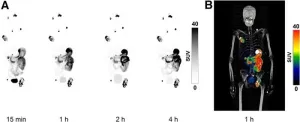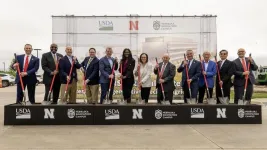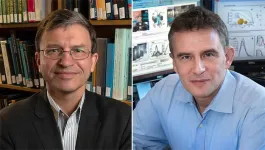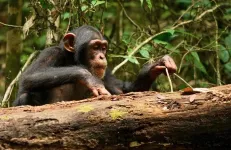Among its many features, GLOBE supports inquiry-based education to promote environmental literacy as well as advances Earth system science and applications. GLOBE was established in 1994 by the U.S. Government and launched worldwide in 1995. It is one of the most long-standing and well-respected education and participatory science consortia dedicated to understanding our global environment and how it is changing. With more than 125 participating countries, GLOBE is also a preeminent program for advancing diplomacy and building a global workforce and collaboration toward a sustainable future.
CUNY was one of only two organizations selected to work with NASA in delivering the GLOBE program’s key elements over the next five years. Specifically, the CUNY team will lead the GLOBE Implementation Office’s Science and its Training, Education, and Public Engagement elements. The work will include designing, implementing, and leading a diverse set of initiatives to elevate GLOBE's visibility and scientific relevance in the realms of STEM education, Earth system research, and science diplomacy.
“GLOBE has been operating for nearly 30 years as a textbook example of a highly effective international community of practice in participatory science, and we are beyond excited to help advance its very urgent work,” said Rebecca Boger, the award’s principal investigator and a professor at Brooklyn College’s and the CUNY Graduate Center’s Earth and Environmental Sciences programs. “The ability to leverage talent across our university, the reach of our academic community, and the extent to which we are embedded in diverse communities throughout New York City put CUNY in an ideal position to support GLOBE participants as agents of change who contribute to building a sustainable and resilient planet.”
“The partnership between CUNY and NASA’s GLOBE program builds on our university’s commitment to advancing education and research in the public interest,” said Rosemarie Wesson, CUNY’s associate vice chancellor and vice provost for research. “It is also a model of the kind of external and internal collaboration that has been a major driver of our growing research enterprise, which last year raised a CUNY-record $633 million in funding. We are delighted that NASA has chosen to partner with our outstanding and diverse faculty researchers from the CUNY Graduate Center and Advanced Science Research Center, Brooklyn College and Lehman College and look forward to contributing to this important global environment program.”
The CUNY-GLOBE partnership will be based at the CUNY ASRC with work germinating at other key locations across the university. Together with partners in the State University of New York at Fredonia and the Institute for Global Environmental Strategies, the team will advance six objectives designed to expand GLOBE’s success.
These objectives are:
Support robust scientific outcomes through programmatic attention to data quality Strengthen GLOBE’s connection to NASA Earth science Expand partnership between the GLOBE community of practice, humanitarian organization, and the greater science and application communities Broaden access to GLOBE through strategic partnership, updated and new resources, open science practices, and emphasis on diversity, equity, and inclusion Increase GLOBE’s role in STEM workforce development Integrate and further develop participatory science infrastructure The grant distribution among the campuses is:
CUNY ASRC: $6.3 million Brooklyn College: $4.1 million Lehman College: $461,645 Graduate Center: $258,115 “We are united in the belief that the past and future successes of the GLOBE program are a clear demonstration of the value of global cooperation toward a sustainable planet,” said Charles Vörösmarty, a co-investigator on the award and founding director of the CUNY ASRC’s Environmental Sciences Initiative. “Our team has experience working with local and international communities of practice in fields as diverse as Earth systems science, climate change, and educational research. Additionally, the ASRC is equipped with the cutting-edge instrumentation needed to design advanced systems to sense, collect, and disseminate data. All of these skills will be put to use in our work to broaden GLOBE’s work across the far corners of the planet.”
"I am thrilled to partner with my colleagues across CUNY in creating new, innovative, and culturally embedded GLOBE resources," said Gillian Bayne, a professor of Science Education at Lehman College and a co-investigator on the award. “Our work will broaden exposure to these resources among unique and diverse communities around the world. The expansion of the GLOBE program will help to empower the next generation of scientists, the scientific community, and citizen scientists at large. We are excited for Lehman College and other CUNY students who will have great opportunities to engage with NASA-GLOBE throughout the duration of this award and beyond."
The CUNY-GLOBE partnership will support research projects in the areas of STEM and Earth and environmental sciences and will actively involve students, faculty, and community-based scientists, GLOBE resources and tools will facilitate data sharing and address data requests. These innovations create additional opportunities to support STEM educators’ and researchers’ career advancement. In addition, the team will work to develop and expand on GLOBE’s participatory science infrastructure, providing more opportunities and additional pathways for the public to contribute to GLOBE science.
“The GLOBE Program is an extensive network of committed individuals and groups who share GLOBE’s core value of furthering STEM educational attainment through active participation in and contribution to purposeful science and applications for the benefit of the global environment,” said Amy P. Chen, NASA GLOBE Program Manager. “The experienced team from CUNY and collaborating partners have an ambitious plan to strengthen and innovate GLOBE’s enabling infrastructure in Science, Training, Education, and Public Engagement. I am looking forward to seeing GLOBE further its reach and impact from this team’s effort.”
About the Graduate Center of The City University of New York
The CUNY Graduate Center is a leader in public graduate education devoted to enhancing the public good through pioneering research, serious learning, and reasoned debate. The Graduate Center offers ambitious students nearly 50 doctoral and master’s programs of the highest caliber, taught by top faculty from throughout CUNY — the nation’s largest urban public university. Through its nearly 40 centers, institutes, initiatives, and the Advanced Science Research Center, the Graduate Center influences public policy and discourse and shapes innovation. The Graduate Center’s extensive public programs make it a home for culture and conversation.
About the Advanced Science Research Center at the CUNY Graduate Center
The Advanced Science Research Center at the CUNY Graduate Center (CUNY ASRC) is a world-leading center of scientific excellence that elevates STEM inquiry and education at CUNY and beyond. The CUNY ASRC’s research initiatives span five distinctive, but broadly interconnected disciplines: nanoscience, photonics, neuroscience, structural biology, and environmental sciences. The center promotes a collaborative, interdisciplinary research culture where renowned and emerging scientists advance their discoveries using state-of-the-art equipment and cutting-edge core facilities.
About Brooklyn College
Widely known for its offer of an excellent education at affordable tuition and recognized nationally for its diverse student body, Brooklyn College has been an anchor institution within the borough of Brooklyn and greater New York City for more than 90 years. With approximately 15,000 students in more than 100 undergraduate and graduate degree programs in the arts, humanities, sciences, education, and business, the college is renowned for its rigorous academics, award-winning faculty, distinguished alumni, and community impact. Part of the City University of New York (CUNY), Brooklyn College offers a vibrant and supportive student experience on a beautifully landscaped 35-acre campus in the borough’s Midwood neighborhood.
About Lehman College
A perennial national leader in promoting social mobility, Lehman College of The City University of New York serves as an intellectual, economic, and cultural center for the Bronx, New York City, and beyond. The college - which sits on a tree-lined 37-acre campus – supports more than 13,000 undergraduate and graduate students, another 14,000 students in continuing and professional programs, and over 90,000 alumni. As a federally designated Hispanic-Serving Institution in the Bronx, Lehman College educates a diverse population of students. The college offers bachelor’s, master’s, and doctoral degrees as well as certificate programs in the liberal arts, sciences, and professions.
About The City University of New York
The City University of New York is the nation’s largest urban public university, a transformative engine of social mobility that is a critical component of the lifeblood of New York City. Founded in 1847 as the nation’s first free public institution of higher education, CUNY today has seven community colleges, 11 senior colleges and seven graduate or professional institutions spread across New York City’s five boroughs, serving more than 225,000 undergraduate and graduate students and awarding 50,000 degrees each year. CUNY’s mix of quality and affordability propels almost six times as many low-income students into the middle class and beyond as all the Ivy League colleges combined. More than 80 percent of the University’s graduates stay in New York, contributing to all aspects of the city’s economic, civic and cultural life and diversifying the city’s workforce in every sector. CUNY’s graduates and faculty have received many prestigious honors, including 13 Nobel Prizes and 26 MacArthur “Genius” Grants. The University’s historic mission continues to this day: provide a first-rate public education to all students, regardless of means or background.
###
END






